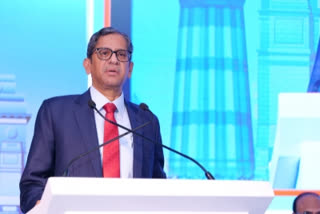Chennai: Chief Justice of India (CJI) N V Ramana on Saturday said there were "certain barriers" as regard the introduction of local languages in the respective High Courts in the country but expressed confidence that the issue may be "solved in the near future" with the help of scientific innovation including Artificial Intelligence (AI). In his address here after laying the foundation stone for a 9-storeyed Administrative Block of the Madras High Court, Justice Ramana also said the Tamil people were always in the forefront of protecting cultural and linguistic rights in the country and made an apparent reference to the anti-Hindi agitation in Tamil Nadu in the 1960s.
Justice Ramana's remarks on the use of local language in High Courts came after state Chief Minister M K Stalin, who also participated in the event on Saturday and made the request, for allowing Tamil to be used in the proceedings before the Madras High Court. "From time to time there have been demands from various regions to allow the use of local language in the proceedings before the high courts as provided under Article 348 of the Constitution. A lot of debate has taken place on this subject.
There are certain barriers that have prevented local language from being adopted for the proceedings before the high courts. I am sure with the innovation in science and technology, the advancement such as Artificial Intelligence, some of the issues associated with the introduction of languages in the high courts may be solved in the near future," the CJI said.
Noting that strengthening judicial institutions has been his "top priority," CJI Ramana said the judiciary had the duty of upholding and enforcing the constitutional values. "During the last one year of my tenure as the Chief Justice of India, I have been highlighting various issues affecting our legal system. The biggest issue affecting all institutions nowadays, including the judiciary is ensuring sustained faith in the eyes of the public. The judiciary is wrested with immense constitutional responsibility of maintaining the rule of law and checking legislative and executive excesses."
